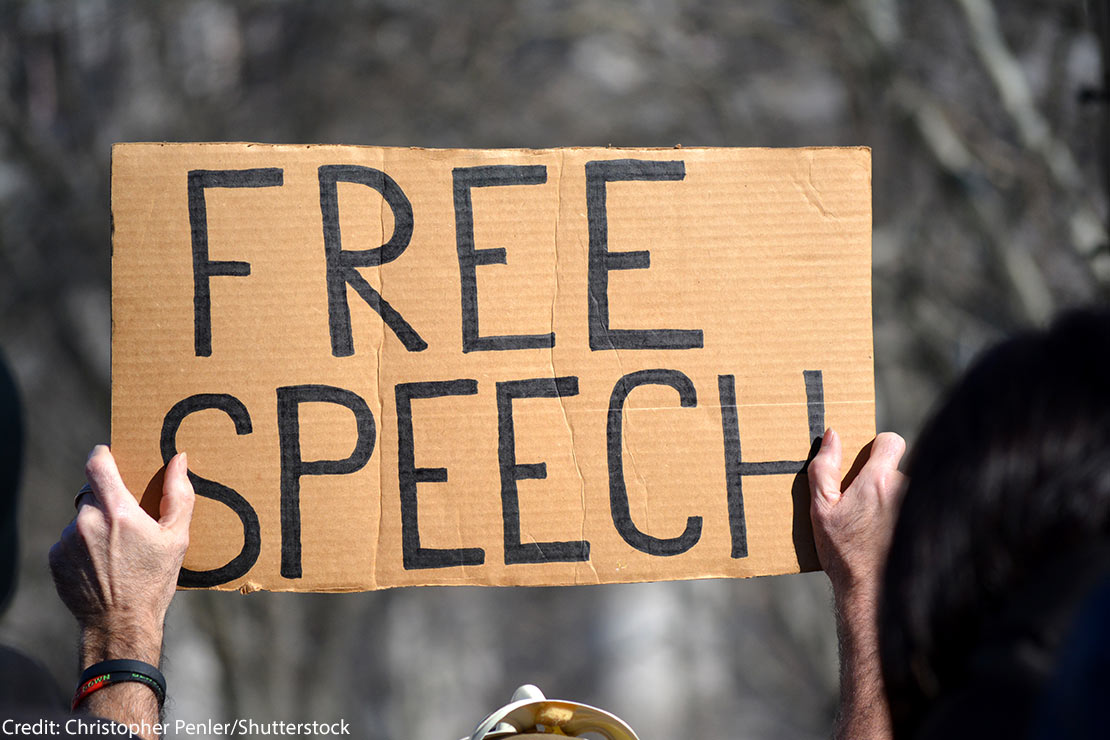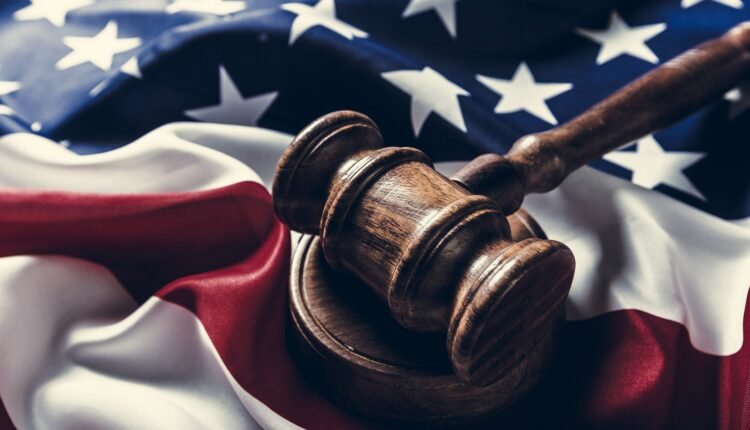The First Amendment protects the freedom of speech and expression in the United States. It prevents the government from enacting laws that restrict these rights.
In the United States, the First Amendment of the Constitution safeguards the fundamental rights of freedom of speech, press, religion, assembly, and the right to petition. This cornerstone of democracy ensures that individuals can express their opinions, beliefs, and ideas without fear of government censorship or suppression.
The First Amendment also encourages open discourse, allows for the free flow of information, and fosters a diverse marketplace of ideas. As a result, it is a crucial element in maintaining a vibrant and democratic society. The protections afforded by the First Amendment have been vital in shaping American culture, politics, and the legal landscape, serving as a critical safeguard against government infringement on individual liberties.
The First Amendment: Foundation Of Free Speech Rights
The First Amendment is the foundational cornerstone of free speech rights in the United States. Its historical background dates back to the country’s establishment, and it serves as a critical safeguard of individual liberties. In modern society, the First Amendment continues to play a crucial role in preserving freedom of expression and the right to peacefully assemble. Its purpose extends to protecting diverse viewpoints and maintaining a space for public discourse. Moreover, the historical context of the First Amendment underscores its enduring significance in contemporary times, as it remains a vital instrument for upholding democratic values and ensuring the protection of speech, press, and religion.
Influential Court Cases Shaping Free Speech Rights
The First Amendment has been shaped by influential court cases, with landmark decisions from the Supreme Court playing a pivotal role in the evolution of free speech interpretation. These legal precedents have defined and redefined the boundaries of free speech rights over time, influencing the protections and limitations that individuals and institutions navigate. From the famous case of Gitlow v. New York in 1925 to the outcry of Brandenburg v. Ohio in 1969, and the significant impact of Morse v. Frederick in 2007, these decisions have marked turning points and set important precedents that continue to shape free speech and its interpretation in present-day legal contexts.
Limitations And Exceptions To Free Speech Rights
The First Amendment guarantees freedom of speech to every citizen, but there are limitations and exceptions to this right. One limitation is defamation and libel laws, which prohibit false statements that harm someone’s reputation. Another limitation is hate speech, which is not protected by the First Amendment if it directly incites violence or discrimination. While these limitations exist, it’s important to note that the interpretation and application of free speech rights can vary in different contexts and jurisdictions. It’s also crucial to understand the nuances and complexities surrounding the protection of free speech, as it continues to be a topic of debate and legal scrutiny.
The Role Of Technology In Free Speech Rights
The First Amendment plays a crucial role in protecting free speech rights, especially in the digital age. With the rise of technology, social media has significantly impacted the exercise of free speech. It has provided a platform for individuals to express their opinions and engage in public discourse, but it has also posed challenges in terms of content moderation and censorship. In this digital era, there are ample opportunities for individuals to have their voices heard, but there are also challenges related to hate speech, misinformation, and online harassment. As technology continues to evolve, it is essential to navigate the complexities of free speech rights in the digital space while seeking to balance freedom of expression with the need for responsible online communication.
First Amendment In Educational Institutions
The First Amendment in educational institutions presents the challenge of balancing free speech and the academic environment. Addressing controversial speakers on campus involves navigating the principles of freedom of expression while ensuring a conducive learning atmosphere. It is essential to consider institutional policies, codes of conduct, and legal boundaries regarding the protection of free speech. Educational institutions must strive to foster an environment where diverse perspectives can be expressed, while also safeguarding the well-being and safety of the campus community. This delicate balance requires thoughtful deliberation and proactive measures to accommodate differing viewpoints without compromising the fundamental values of higher education.
Protecting Free Speech In The Workplace
Protecting free speech in the workplace is essential for maintaining a healthy and open work environment. Employee rights and employer responsibilities play a crucial role in ensuring that individuals can freely express their opinions and beliefs without fear of retaliation or discrimination. It is important to navigate political speech and expression carefully, considering the impact it may have on workplace harmony and productivity. When addressing these issues, it’s essential to establish clear guidelines and policies that respect the First Amendment while also upholding the values of the organization. This approach can help create a balanced and inclusive workplace culture, where diverse viewpoints are valued and respected.
Free Speech And National Security
Balancing Security Concerns with First Amendment Rights
Government Control and Freedom of Speech
The First Amendment of the United States Constitution guarantees individuals the right to freedom of speech. This fundamental right allows individuals to express their opinions and ideas without fear of government retaliation or censorship. However, in the context of national security, the government has a responsibility to ensure the safety and protection of its citizens. This balancing act between security concerns and First Amendment rights is often a contentious and complex issue.
Government Control and Freedom of Speech
The government’s efforts to control and monitor certain forms of speech in the interest of national security have sparked debates about the limits of free speech. While some argue that certain restrictions are necessary to safeguard the country, others emphasize the importance of preserving individual liberties and democratic values. Finding the equilibrium between maintaining national security and safeguarding the right to free speech is an ongoing challenge that requires careful consideration and dialogue.
Defending Free Speech In Public Spaces
Free speech is a fundamental right protected by the First Amendment of the United States Constitution. This amendment ensures that individuals have the right to express their opinions in public spaces. Protests and demonstrations are important forms of free speech that allow people to voice their concerns and advocate for change. Public forums, such as parks and streets, are commonly used for these activities. However, government restrictions on the time, place, and manner of speech in these spaces must be carefully evaluated to ensure that they do not unduly infringe upon individuals’ First Amendment rights.
International Perspectives On Free Speech Rights
When we consider International Perspectives on Free Speech Rights, it is crucial to acknowledge the diverse approaches to Comparing Free Speech Laws Across Countries. In various nations, Global Challenges to Free Speech prevail, encompassing legal, cultural, and social dimensions. While some countries prioritize absolute free speech, others impose limitations to protect specific interests. Additionally, international organizations play a significant role in shaping global attitudes towards free speech rights through conventions and agreements. Understanding these diverse perspectives on free speech is imperative in a globalized world, as it facilitates constructive dialogue and informed decision-making.
Advocacy And Activism For Free Speech Rights
Advocacy for free speech rights is critical for maintaining an open and democratic society. Many organizations and movements are dedicated to supporting this fundamental freedom. Grassroots efforts play a vital role in protecting free speech, as they empower individuals to express their views without fear of censorship or reprisal. These initiatives mobilize communities to defend the First Amendment and champion civil liberties. By harnessing the collective voice of citizens, these efforts contribute to a robust and inclusive public discourse. Through the work of various organizations and movements, the protection of free speech is advanced and safeguarded for present and future generations.
The Future Of Free Speech Rights
The First Amendment plays a crucial role in shaping the future of free speech rights. As societal norms and technologies continue to evolve, so do the emerging issues and trends related to free speech. Navigating through this landscape requires a keen understanding of the legal landscape and the ways in which communication platforms are being transformed. The intersection of technology, social media, and legislation has created a dynamic environment that demands constant evaluation and adaptation. To ensure protection of free speech rights, it is essential to stay abreast of the changing landscape and be prepared to address the complex issues that arise.

Credit: www.aclu.org
Frequently Asked Questions For First Amendment
What Does The First Amendment Protect?
The First Amendment protects freedom of speech, religion, press, assembly, and petition.
How Does The First Amendment Impact Society?
The First Amendment fosters a diverse and vibrant society by promoting free expression and the exchange of ideas.
Can The Government Limit First Amendment Rights?
The government can only limit First Amendment rights if there is a compelling reason and the limitation is narrowly tailored.
Why Is The First Amendment Important In A Democracy?
The First Amendment is crucial in a democracy as it ensures citizens can freely voice their opinions and hold the government accountable.
What Are Some Common Misconceptions About The First Amendment?
One common misconception is that the First Amendment protects all types of speech, including hate speech.
Conclusion
In crafting the First Amendment, the Founding Fathers ensured the protection of free speech, religion, and assembly. These rights are the cornerstone of a democratic society, enabling individuals to freely express their opinions without fear of censorship. As we uphold these principles, we honor the ideals upon which our nation was founded.


